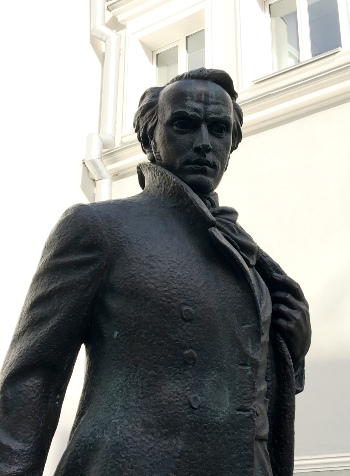 The Taras Shevchenko Museum is located in Shevchenko’s beloved Kyiv in a mansion formerly owned by a wealthy sugar magnate. This juxtaposition of housing the most comprehensive collection of artifacts, paintings and memorabilia from Shevchenko’s life, surrounded by such opulence is ironic and poignant. For Ukrainians, Shevchenko is the premiere national hero. Son of a serf, at once a novelist and a painter, a poet and a prisoner, Shevchenko was a celebrity and political figure, who finally returned home to the area near the town of Kaniv, to be buried after his death. To a new generation of Ukrainians, those born after the Soviet era, raised with a unique identity, and who came of age in the era of EuroMaidan, Shevchenko’s dream of Ukrainian freedom resonates with renewed vigor. The museum provides an opportunity for foreigners and natives alike to make his acquaintance and to draw lessons from his writings on the past and future of Ukraine.
The Taras Shevchenko Museum is located in Shevchenko’s beloved Kyiv in a mansion formerly owned by a wealthy sugar magnate. This juxtaposition of housing the most comprehensive collection of artifacts, paintings and memorabilia from Shevchenko’s life, surrounded by such opulence is ironic and poignant. For Ukrainians, Shevchenko is the premiere national hero. Son of a serf, at once a novelist and a painter, a poet and a prisoner, Shevchenko was a celebrity and political figure, who finally returned home to the area near the town of Kaniv, to be buried after his death. To a new generation of Ukrainians, those born after the Soviet era, raised with a unique identity, and who came of age in the era of EuroMaidan, Shevchenko’s dream of Ukrainian freedom resonates with renewed vigor. The museum provides an opportunity for foreigners and natives alike to make his acquaintance and to draw lessons from his writings on the past and future of Ukraine.